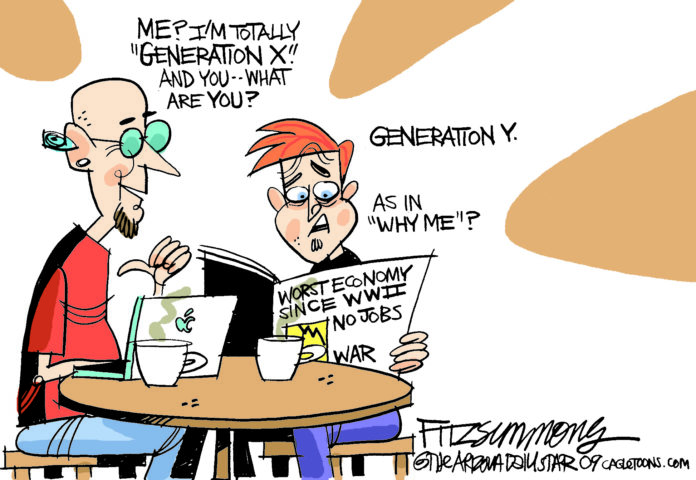Third in a six-part series on American politics in the Millennial Age.
BY CHRISTIAAN MITCHELL
 Last week’s article presented two questions that Millennials have to ask if we want to move forward with addressing our disengagement from politics. Specifically, it asked if our disgust with the political process results from problems unique to Millennials, and if so, what are we to do?
Last week’s article presented two questions that Millennials have to ask if we want to move forward with addressing our disengagement from politics. Specifically, it asked if our disgust with the political process results from problems unique to Millennials, and if so, what are we to do?
In answer to the first question, I laid out an argument that the failures of our political system are leaving us a nation radically different from that which we were promised. This generational bait-and-switch, and the problems that are likely to flow from it, justifies a Millennial-focused approach to fixing our political system.
This rest of this series will be devoted to answering the second question: What do we do?
Making Our Political Ideas Clear
In the first article, I made the case that the root of Millennials’ political disengagement lays in the emptiness of our political dialogue. This emptiness results from the fact that our politics is discussed as abstract ideology, rather than as concrete policy-making. We can talk about our rights until we’re blue in the face, but they are fundamentally meaningless unless you can translate them into specific actions, policies, regulations, etc. Until you get something that can specifically limit or compel a particular person or persons, you’re only building castles in the sky.
If we’re going to rehabilitate our politics, then we’re going to have to start thinking about politics more Pragmatically. That means that we have to recognize that our politics will continue to be empty unless we obsessively focus our attention on the practical and verifiable consequences that flow from a given idea or policy proposal.
The debate over the Second Amendment provides a good example of what I mean. The conversation, particularly here in Oklahoma, is often viewed as an unbridgeable gap between people who believe that we have a right to guns and those who don’t. However, when it is framed instead in concrete, specific terms, it turns out that we all basically agree about the Second Amendment. Few people would say that a recently released violent felon with a history of mental illness ought to be able to walk into a Walmart and buy an AK-47 with a thousand rounds of ammunition.
In the concrete, we all agree that there is such a thing as reasonable gun regulations. Our task isn’t to reconcile incompatible principles. It’s to find a workable line between who should be allowed to buy guns and who shouldn’t. That discussion has to take place in the context of concrete particulars. However, our focus on the abstract Right to Bear Arms cripples that discussion and prevents any meaningful action to address a terrifyingly chronic problem.
But that’s just a single example. If we are going to build a new politics for this generation, we need to see what this move away from the abstract means more broadly.
Freedom
First, this approach puts to rest questions about the proper role of government. We have a long-standing national obsession with the proper role of government. We typically begin with some statement of first principles about why government was created. This then proceeds into a series of statements about what kinds of a government so created should be engaged in. And finally it ends in accepting or [usually] rejecting this or that course of action because it’s something government should or shouldn’t be doing.
However, a Pragmatic approach would focus our attention less on why government exists and more on what we get out of having a government. Instead of wedding ourselves to one [typically incomplete and/or inaccurate] version of history about why humans create states, we can start from the idea that it’s just something that we do that gives us certain positive results. It doesn’t matter why we organize states, what matters is what benefits we get from doing so and what further benefits we can realize by adopting this or that program.
This way, ideas like “government,” “the State,” and “Law” look less like metaphysical entities that dictate social forms, and more like tools that we use to organize ourselves to achieve common goals like stability, prosperity, security, etc. The extent to which we’re actually achieving those goals, rather than matching some idea about how things should be, becomes the way that we know whether what we’re doing is working.
In short, government becomes a tool for social progress rather than a god to be served.
Progress
Many will raise the concern that if we detach ourselves from a firm set of principles about the natural limitations of government, then we open the floodgates to all manner of tyrannies and un-Americanisms. Again, the Second Amendment debate is illustrative. We’re told that if we pull away from what the Supreme Court has decided was the Framer’s intent, then we get the Holocaust, Stalin, and Mao. But this reveals a profound mistrust of the American people and a complete lack of faith in the resilience of our cultural institutions to that kind of abject tyranny.
A Pragmatic reading of our system understands social progress as an evolutionary process. This not only involves experimentation with new forms and structures, but also the conservation of things that are working well. And our system is built on the fundamental faith that this conservatively progressive process can be well controlled and moderated by people’s engagement with social affairs. Provided, that is, that that engagement is tempered with a robust sense of what it means to have a healthy social dialogue.
For us, that means that we have to reject out of hand arguments that would tell us that this or that approach is not an appropriate thing for government to do. And we should view with equal suspicion those who insist that this or that change is going to destroy the character of America, and those who fall into the trap of wanting to change something simply because it’s traditional.
Instead, in every case we have to ask what benefits are we trying to garner, will this or that program give us those benefits, and finally what existing benefits will we lose if we adopt it? In short, we have to approach policy questions like adults. The extent to which this is a point that needs to be made is a good indicator of the depth of our current troubles.
Civility
If there is a single way in which our tendency towards abstract, ideology-driven politics has eroded our ability to function, it is that it has completely destroyed our sense of civility. By “civility” I mean more than simple politeness. Instead, I mean something closer to civitas, the sense that by participating in society we create something more than ourselves; that the social compact has a compelling existence of its own.
During the days of the Founders this idea found its expression in the notion of republican virtue. Put Pragmatically, it means taking what John Dewey called the idea of democracy as a personal moral commitment.
The distinction between the idea and technology of democracy is crucial. Democracy’s technologies are things like representation, universal suffrage, party primaries, etc. However, the idea of democracy is something much deeper. It is the organizing principle that tells us that individuals have a right to benefit from and shape the common values of the groups they belong to [including our largest group: the nation], and that those groups have a right to demand the devotion and effort of their members to sustain those values.
For a Millennial politics, this means that we must renew our faith in two longstanding principles of American government. First, we have a right to insist that our voices be heard in the governing process, and as a part of that we have an obligation to ensure that all voices are heard. Secondly, we are obligated to participate in our public life beyond showing up once every four years to vote.
In short, we have to commit ourselves to taking the promotion of the public interest through public service as a personal moral obligation. For all of its flaws, our system is founded in the idea that we are the government.
Therefore, to the extent that we don’t engage in the process [at every level], we are complicit in everything that is going on.
The New Ideology
If our generation is going to have any hope for a livable future, we are going to have to create a way of thinking about public affairs that can rehabilitate our politics. In order for that to work, we will have to find something that avoids the ways of thinking that have caused us so much trouble. In short, we need an anti-ideology ideology.
By approaching the problem of government Pragmatically, we get at least three broad principles that can form a basis for this new approach. First, we should understand government as a tool for improving social conditions, rather than as some metaphysical being born to serve a set of abstract principles. Second, we should understand progress as an evolutionary process that, when approached with concrete and specific problems in mind, acts to conserve what works and improve what doesn’t. Finally, democratic government only works when every person takes engagement in public affairs for the common good as a personal goal.
Taken together, these ideas outline a picture of a generational politics that can reshape the way that our governmental institutions work.
The irony of laying out a set of political principles to call for fewer principles in politics should not be lost on anyone. Next week’s article will begin the process of filling in this sketch of what we need to do in the coming decades to get ourselves back on track.
– Christiaan Mitchell is a lawyer who holds master’s degrees in philosophy and education. He lives in Bartlesville.








